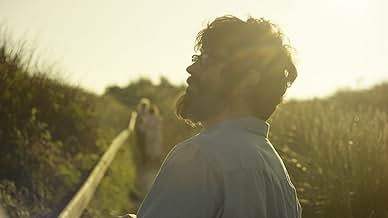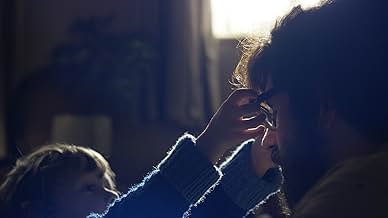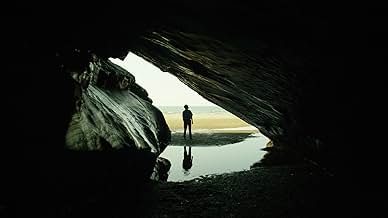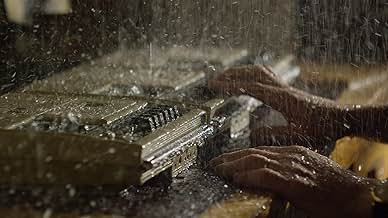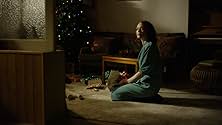PUNTUACIÓN EN IMDb
7,0/10
2,2 mil
TU PUNTUACIÓN
En el verano de 1983, días antes del nacimiento de su hijo, el teólogo John Hull se queda ciego.En el verano de 1983, días antes del nacimiento de su hijo, el teólogo John Hull se queda ciego.En el verano de 1983, días antes del nacimiento de su hijo, el teólogo John Hull se queda ciego.
- Dirección
- Guión
- Reparto principal
- Nominado a 3 premios BAFTA
- 4 premios y 15 nominaciones en total
John M. Hull
- Self
- (voz)
Marilyn Hull
- Self
- (voz)
Dan Renton Skinner
- John Hull
- (as Dan Skinner)
Sidney Warbrick
- Thomas
- (as Sidney Nicholas Warbrick)
Stanley Warbrick
- Thomas
- (as Stanley John Warbrick)
Reseñas destacadas
This is a semi-dramatized documentary focusing on retelling the audio memoirs of a man going blind. If that sounds slightly unusual, it's because it is. The cast lip sync the actual recorded words spoken by John Hull and his wife who detailed his descent into the debilitating world of visual impairment in the 1980s.
The memoirs capture the pure physical and psychological turmoil experienced by John as he experiences this loss of vision, and as he says he battles to live in reality instead of this nostalgic world that his brain is forcing upon him. The dreams he experiences and the way he describes them are beautiful bittersweet torture - as it is his only way of conjuring new images into his world, yet he wakes every morning crestfallen, as he remembers he cannot see, and they were just dreams. One night he dreams he can see his new child that was born after he lost his sight. The way this scene is directed (by Peter Middleton & James Spinney) is as magical as it is emotive.
John expresses to us that he believes part of his brain is dying as a portion of it no longer requires power to process images. He says he feels hungry for stimulation that he just cannot obtain. He also forgets what his wife looks like, which must be pure agony. The frustration of being rendered effectively useless as a parent also weighs heavily on his mind, and some points on the audio tapes you can almost feel the depression that John must be battling.
Dan Renton Skinner does an unbelievable job as the taunted John Hull. His facial expressions transport us into this hell that John must have been in and his performance is one of the most captivating of any portraying an illness / disability that I can remember.
I couldn't wait to splash down a few words about this film in the hope that just 1 or 2 people watch it as a result. That has to be a sign that of its' quality.
Beautiful agony
The memoirs capture the pure physical and psychological turmoil experienced by John as he experiences this loss of vision, and as he says he battles to live in reality instead of this nostalgic world that his brain is forcing upon him. The dreams he experiences and the way he describes them are beautiful bittersweet torture - as it is his only way of conjuring new images into his world, yet he wakes every morning crestfallen, as he remembers he cannot see, and they were just dreams. One night he dreams he can see his new child that was born after he lost his sight. The way this scene is directed (by Peter Middleton & James Spinney) is as magical as it is emotive.
John expresses to us that he believes part of his brain is dying as a portion of it no longer requires power to process images. He says he feels hungry for stimulation that he just cannot obtain. He also forgets what his wife looks like, which must be pure agony. The frustration of being rendered effectively useless as a parent also weighs heavily on his mind, and some points on the audio tapes you can almost feel the depression that John must be battling.
Dan Renton Skinner does an unbelievable job as the taunted John Hull. His facial expressions transport us into this hell that John must have been in and his performance is one of the most captivating of any portraying an illness / disability that I can remember.
I couldn't wait to splash down a few words about this film in the hope that just 1 or 2 people watch it as a result. That has to be a sign that of its' quality.
Beautiful agony
I love the concept behind these. Using actual tapes, editing them together in a way to present them as a narrative, and then creating the visuals to match it. The fact that it is a story about a man who no longer can see, adds to it. It's an interesting way to mix truth and fiction, because the story and dialogue is all real, and could have been presented as a documentary of sorts. But by editing them, adding the environmental sounds, and getting actors to "play it out", it blurs the line in a really interesting way. That, in addition to some of the insights into how it is to become blind, are the clear highlights of the movie. Sadly, it does not have much more to offer that's very interesting.
In a way, ironically, I think this story would work better as just the audio. The editing done was brilliant, and combine with the atmospheric sounds added, I think it could have been a really good radio story. With an added level that a story about blindness would have no visuals.
In a way, ironically, I think this story would work better as just the audio. The editing done was brilliant, and combine with the atmospheric sounds added, I think it could have been a really good radio story. With an added level that a story about blindness would have no visuals.
The premise behind this is quite intriguing and so going into it I was really curious about how the whole thing would be executed. It's a documentary and drama film at the same time. It reminded me a lot of The Diving Bell and the Butterfly. There's something quite lyrical and poetic about the filmmaking. The cinematography needed to really capture the kinds of images that could be going around this man's head and through the recorded audio it is able to effectively capture that. I think a problem I had with the film is that I never fully connected with it. I was only able to admire it from a distance because of that disconnect, and because of that I am able to recommend it and say that it is worth the effort. However, it is unfortunate that I wasn't able to like it more.
I want to shower praise on the director, actors and everyone involved in this film. But this magnificent meditation exceeds the sum of its parts. If you tackle your life head on. If you question the relationship between your senses and your awareness and, indeed, what that might imply about what you are. If you appreciate the right amount of silence, and delicate, subtle cinematography. If you are moved by music that infuses the narrative with a thoughtful atmosphere. If you respect originality of technique in an industry that is struggling with habit. If all of these and then that ineffable magic of something greater, then please, experience this.
This is a strange and powerful film. It's basically a documentary, with the parts of the people involved portrayed on screen by actors, lip-synching the real life words of the participants. It makes for an other-worldly experience, that's gives a deep insight in to the at once familiar but also utterly alien the main protagonist is forced to inhabit.
The film relates the experiences of John Hull, a writer and theologian who found himself losing his sight just before the birth of his first child. To make sense of his experiences he taped his thoughts - first, reflections on the more practical part of his experiences. As someone who needed to read for his work, for example, he went searching for audiobooks of the academic texts he needed. He discovered that it was assumed that 'blind people don't read big books'; so with an army of friends and families, a library of his books was committed to tape.
As time passes he discovers he needs to understand the condition itself, not just the practicalities of it; he'd found himself so busy preparing for and learning to live with blindness that it prevented him for understanding it. He had to learn to think about his condition: 'If I didn't understand, it would defeat me'.
So begins a series of profound reflections which, as a person who has lived with chronic pain for 20 years, I find very resonant and truthful. The person offering a miracle cure (hypnotherapy) who can't accept John's insistence that his eyes won't just grow back; the people who say he doesn't want his sight back because he seems to have adjusted to it. If we complain about our condition, we're classified as defeatist moaners; if we accept it (as we have to), we've given up (especially as Christians). Onlookers seem only to have categories for the heroic overcomer or pathetic victim; there's no room for someone to keep on, keeping on.
The reflection that 'everyday I wake up, I've lost my sight again'; a painfully truthful expression of the reality that every day I wake up, I'm in pain again.
The reflection on why bad things happen to Christians - 'why shouldn't they happen to me?'; a line I've used myself. This struggle seems to be a bigger one for the people around us, then for the sufferers ourselves. As he says 'I don't regard faith as a shield against the normal ups and downs of life'.
His child screams; they rush to discover it's a finger trapped in a door, but even so he's impotent. "The discovery that you're useless is not a nice discovery for a father to make'; how true. I lie some days in pain, aware of my enforced physical absence from my children and my apparent uselessness as a result.
There are many more moments to reflect on, but the surreal and moving conclusion is the most weighty, as John's dreams are shown melting in to on-screen reality. He ends at a point where blindness (chronic illness) either enables in the sufferer some kind of rebirth, or it destroys you. As he says this, him and his family are soaked in rain, a symbolic baptism and regeneration. It's truthful, healing and challenging all at once.
A unique and wonderful film, to be lived with and drunk deep from - especially for chronic illness sufferers and those who travel with them.
The film relates the experiences of John Hull, a writer and theologian who found himself losing his sight just before the birth of his first child. To make sense of his experiences he taped his thoughts - first, reflections on the more practical part of his experiences. As someone who needed to read for his work, for example, he went searching for audiobooks of the academic texts he needed. He discovered that it was assumed that 'blind people don't read big books'; so with an army of friends and families, a library of his books was committed to tape.
As time passes he discovers he needs to understand the condition itself, not just the practicalities of it; he'd found himself so busy preparing for and learning to live with blindness that it prevented him for understanding it. He had to learn to think about his condition: 'If I didn't understand, it would defeat me'.
So begins a series of profound reflections which, as a person who has lived with chronic pain for 20 years, I find very resonant and truthful. The person offering a miracle cure (hypnotherapy) who can't accept John's insistence that his eyes won't just grow back; the people who say he doesn't want his sight back because he seems to have adjusted to it. If we complain about our condition, we're classified as defeatist moaners; if we accept it (as we have to), we've given up (especially as Christians). Onlookers seem only to have categories for the heroic overcomer or pathetic victim; there's no room for someone to keep on, keeping on.
The reflection that 'everyday I wake up, I've lost my sight again'; a painfully truthful expression of the reality that every day I wake up, I'm in pain again.
The reflection on why bad things happen to Christians - 'why shouldn't they happen to me?'; a line I've used myself. This struggle seems to be a bigger one for the people around us, then for the sufferers ourselves. As he says 'I don't regard faith as a shield against the normal ups and downs of life'.
His child screams; they rush to discover it's a finger trapped in a door, but even so he's impotent. "The discovery that you're useless is not a nice discovery for a father to make'; how true. I lie some days in pain, aware of my enforced physical absence from my children and my apparent uselessness as a result.
There are many more moments to reflect on, but the surreal and moving conclusion is the most weighty, as John's dreams are shown melting in to on-screen reality. He ends at a point where blindness (chronic illness) either enables in the sufferer some kind of rebirth, or it destroys you. As he says this, him and his family are soaked in rain, a symbolic baptism and regeneration. It's truthful, healing and challenging all at once.
A unique and wonderful film, to be lived with and drunk deep from - especially for chronic illness sufferers and those who travel with them.
Argumento
¿Sabías que...?
- CuriosidadesWhen it was shown on British TV, the film was made available with two soundtracks. The first was a "heightened soundtrack" produced by one of Europe's leading sound designers, Joakim Sundström, who created a rich, immersive soundtrack calibrated specifically for blind audiences, using enhanced sound design and additional audio from the characters to guide the audience through the story. The second was a more regular audio described version read by Stephen Mangan.
- Citas
John M. Hull: What I remember about you most vividly in those years was your amazing practicality. You never expressed regrets. You just got on with the next thing, step by step. The way you did that, I always thought was incredible.
- ConexionesRemake of Notes on Blindness (2014)
Selecciones populares
Inicia sesión para calificar y añadir a tu lista para recibir recomendaciones personalizadas
- How long is Notes on Blindness?Con tecnología de Alexa
Detalles
Taquilla
- Recaudación en todo el mundo
- 104.214 US$
- Duración1 hora 30 minutos
- Color
- Mezcla de sonido
- Relación de aspecto
- 2.35 : 1
Contribuir a esta página
Sugerir un cambio o añadir el contenido que falta

Principal laguna de datos
What is the English language plot outline for Contemplación (2016)?
Responde


